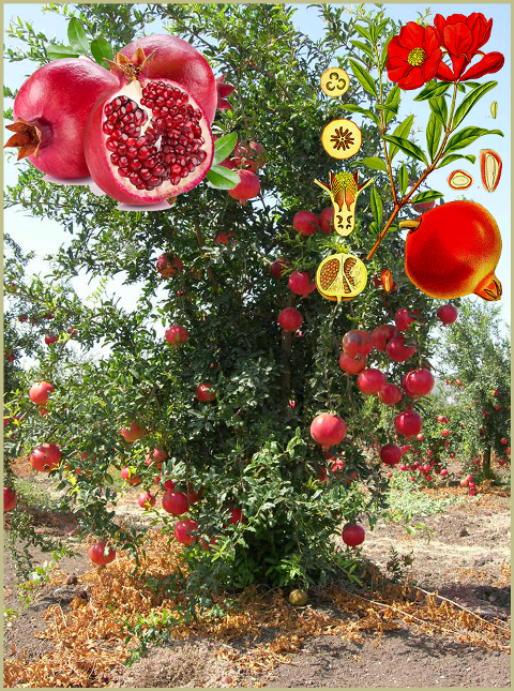Pomegranate

The pomegranate originated in the region of modern-day Iran and has been cultivated since ancient times throughout the Mediterranean region and northern India. It was introduced into America (Spanish America) in the late 16th century and California by Spanish settlers in 1769.
Today, it is widely cultivated throughout the Middle East and Caucasus region, north Africa and tropical Africa, the Indian subcontinent, Central Asia, and the drier parts of southeast Asia. It is also cultivated in parts of California and Arizona.
One of the oldest known fruits, found in writings and artifacts of many cultures and religions, the pomegranate (punica granatum) is an original native of Persia. This nutrient dense, antioxidant rich fruit has been revered as a symbol of health, fertility and eternal life.
If you're not familiar with the pomegranate, it is a red fruit with a tough outer layer; only the juice and the seeds inside are edible. Pomegranate juice is available year round, but you can purchase fresh pomegranates in most grocery stores from September through January. When refrigerated in a plastic bag, pomegranates keep for up to 2 months. Try tossing the seeds on a salad for a brilliantly colorful, crunchy, and nutritious addition.
Seeding a pomegranate may seem like a lot of work for just a piece of fruit but think again, getting at those seeds may be well worth it. The pomegranate is a nutrient dense food source rich in phytochemical compounds. Pomegranates contain high levels of flavonoids and polyphenols, potent antioxidants offering protection against heart disease and cancer. A glass of pomegranate juice has more antioxidants than red wine, green tea, blueberries, and cranberries.
This fantastic little fruit recently made its way back into the news after some spectacular clinical results. Here's what you need to know:
A compound found only in pomegranates called punicalagin is shown to benefit the heart and blood vessels. Punicalagin is the major component responsible for pomegranate's antioxidant and health benefits. It not only lowers cholesterol, but also lowers blood pressure and increases the speed at which heart blockages (atherosclerosis) melt away.
Recent medical research studied heart patients with severe carotid artery blockages. They were given an ounce of pomegranate juice each day for a year. Not only did study participants' blood pressure lower by over 12 percent, but there was a 30 percent reduction in atherosclerotic plaque. Just as astounding, participants who did not take the pomegranate juice saw their atherosclerotic plaque increase by 9 percent.
In other studies, potent antioxidant compounds found in pomegranates have shown to reduce platelet aggregation and naturally lower blood pressure, factors that prevent both heart attacks and strokes.
Not only are pomegranates good for your heart and blood vessels but they have been shown to inhibit breast cancer, prostate cancer, colon cancer, leukemia and to prevent vascular changes that promote tumor growth in lab animals. Several in vitro studies have shown this remarkable anti-cancer effect. Additional studies and clinical trials currently taking place are hopeful to reveal this fascinating effect on humans.
Also of note, pomegranate juice contains phytochemical compounds that stimulate serotonin and estrogen receptors, improving symptoms of depression and increasing bone mass in lab animals.
